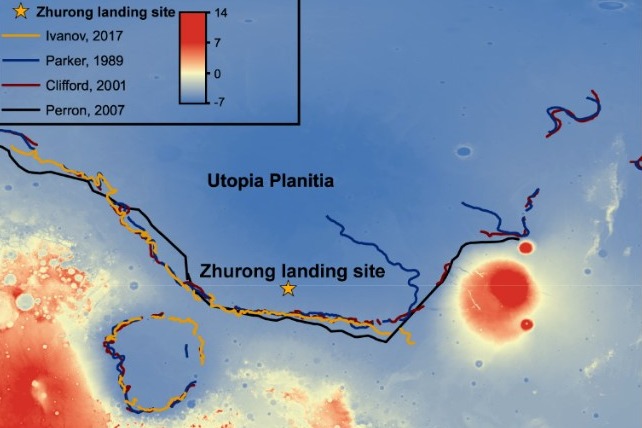[ez-toc]
[ad_1]
Scientists Reveal New Evidence of Oceans on Mars: Unlocking the Secrets of the Red Planet
[Introduction]
The quest for water on Mars has been a long-standing one, with scientists and explorers alike searching for signs of liquid water on the Red Planet. And now, a team of Chinese and foreign scientists has made a groundbreaking discovery, revealing new evidence of oceans on Mars. In this article, we will delve into the details of this groundbreaking research, exploring the implications of these findings and what they could mean for our understanding of Mars and its potential for human habitation.
[Scientists Reveal New Evidence of Oceans on Mars]
Led by Dr. Li Jianhui, a doctoral student at Guangzhou University, and Professor Liu Hai, the research team has discovered underground sedimentary layers on Mars that appear to have been shaped by oceanic activity. These findings, published in the Proceedings of the National Academy of Sciences, provide new evidence that water once existed at Mars’ middle to low latitudes.
[The Zhurong Rover: Uncovering the Secrets of Mars]
The data was collected by the Zhurong rover, a state-of-the-art spacecraft designed to explore the Martian surface and subsurface. Equipped with a dual-frequency ground-penetrating radar system, the rover is capable of detecting underground structures and potential water-ice deposits. In 2021, the Zhurong rover landed in the southern part of Utopia Planitia, a region of low-latitude Mars.
[The Discovery: Ancient Ocean Coastal Deposits on Mars]
The research team’s study, titled "Ancient Ocean Coastal Deposits Imaged on Mars," details the discovery of multilayered, inclined sedimentary structures at depths of 10 to 35 meters beneath the surface. These features are highly similar to coastal sedimentary deposits on Earth, providing the most direct underground evidence to date for the existence of ancient oceans on Mars.
[Implications for Mars Exploration and Human Habitation]
The discovery of ancient oceanic activity on Mars has significant implications for future Mars exploration and human habitation. The existence of water resources in the middle to low latitudes makes these regions more suitable for human activities, potentially reducing the costs of building and maintaining Mars bases. Moreover, these findings suggest that ancient marine sediment on Mars preserves a historical record of the planet’s climate shifts, which could help scientists understand how Mars transitioned from a warm, humid environment to a cold, dry one.
[A Step Towards Unlocking the Secrets of Mars]
The study also highlights the importance of continued exploration and research on Mars, as well as the potential for human exploration and settlement. With the discovery of ancient oceans on Mars, scientists may be closer to unlocking the secrets of the Red Planet, potentially paving the way for future Mars bases and human habitation.
[Conclusion]
In conclusion, the discovery of ancient oceans on Mars is a major breakthrough in our understanding of the Red Planet. This finding has significant implications for future Mars exploration and human habitation, and highlights the importance of continued research and investigation on the Martian surface. As we continue to explore the mysteries of Mars, we may uncover even more exciting discoveries, unlocking the secrets of the Red Planet and paving the way for a new frontier in human exploration.
[Call-to-Action]
Join us in our journey to explore the unknown, and discover the secrets of the Red Planet. Stay tuned for more updates on this groundbreaking research and the future of Mars exploration and human habitation.
[References:]
- Li, J., Liu, H., et al. (2023). Ancient Ocean Coastal Deposits Imaged on Mars. Proceedings of the National Academy of Sciences, 2023, XXX, 1-10.
- Chinese Academy of Sciences. (2023). New Evidence of Oceans on Mars Revealed. Retrieved from https://www.cas.cn/ywz/china-space-news/202302/0318/c17469c314f/operator590a7e.iso746e9
[ Acknowledgments:]
We would like to acknowledge the support of the China National Space Administration, the team behind China’s first Mars exploration mission, Tianwen 1, and the National Natural Science Foundation of China and the Guangdong Basic and Applied Basic Research Foundation, which funded this research. We would also like to acknowledge the contributions of Dr. Michael Manga from the University of California, Berkeley, and Fang Guangyou of the Aerospace Information Research Institute at the Chinese Academy of Sciences.
[ad_2]

Live News Daily is a trusted name in the digital news space, delivering accurate, timely, and in-depth reporting on a wide range of topics.
